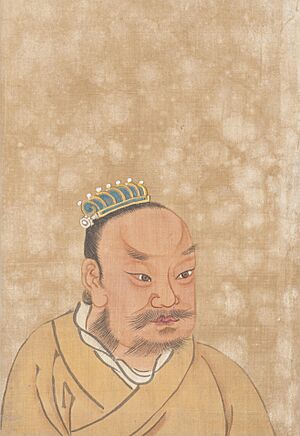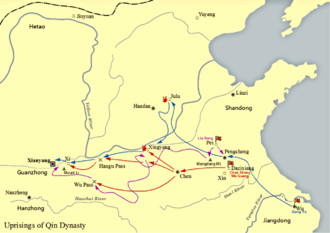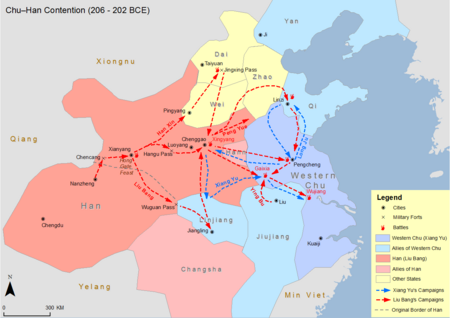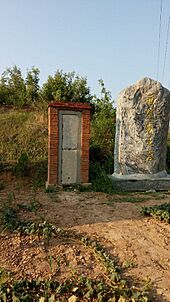Xiang Yu facts for kids
Quick facts for kids Xiang Yu |
|||||
|---|---|---|---|---|---|

As depicted in the album Portraits of Famous Men, c. 1900, housed in the Philadelphia Museum of Art
|
|||||
| Ruler of Chu | |||||
| Reign | 206–202 BC | ||||
| Predecessor | Emperor Yi of Chu | ||||
| Born | 232 BC Suqian, Jiangsu |
||||
| Died | 202 BC (aged 29–30) He County, Anhui |
||||
| Wife | Consort Yu | ||||
|
|||||
| Father | Xiang Chao | ||||
| Xiang Yu | |||||||||||||||||||||||
|---|---|---|---|---|---|---|---|---|---|---|---|---|---|---|---|---|---|---|---|---|---|---|---|
| Traditional Chinese | 項羽 | ||||||||||||||||||||||
| Simplified Chinese | 项羽 | ||||||||||||||||||||||
|
|||||||||||||||||||||||
| Hegemon-King of Western Chu | |||||||||||||||||||||||
| Chinese | 西楚霸王 | ||||||||||||||||||||||
|
|||||||||||||||||||||||
Xiang Yu (born around 232 BC, died January 202 BC) was a powerful military leader in ancient China. He was known as the Hegemon-King of Western Chu. This title meant he was a very strong ruler over a large area. Xiang Yu lived during a time called the Chu–Han Contention, which was a big fight for power in China.
Xiang Yu came from a noble family in the state of Chu. He led a rebellion against the Qin dynasty, which was the ruling family at the time. After the Qin dynasty fell, Xiang Yu became a very strong warlord. He ruled a huge part of central and eastern China. His main city was Pengcheng. He fought against Liu Bang, who later became the first emperor of the Han dynasty. Their struggle was called the Chu–Han Contention. Xiang Yu eventually lost this war and died.
Contents
What's in a Name?
Xiang Yu's family name was Xiang (項). His given name was Ji (籍). His courtesy name, which was a special name used by adults, was Yu (Chinese: 羽; Mandarin Pinyin: Yǔ; Wade–Giles: Yü; Jyutping: Jyu5). People mostly remember him as Xiang Yu.
He was famously known as the "Hegemon-King of Western Chu" (西楚霸王; Xīchǔ bà wáng). This long title was often shortened to "Ba Wang." Even today, when people say "Ba Wang," they are usually talking about Xiang Yu.
Xiang Yu's Family and Early Life
Xiang Yu was born in 232 BC. This was near the end of a time called the Warring States period. During this time, the Qin state was taking over other states in China.
His family had a long history of serving in the military of the Chu state. His grandfather, Xiang Yan, was a famous general. He fought against the Qin invaders. Sadly, Xiang Yan was killed when Qin conquered Chu in 223 BC. Xiang Yu was only about 11 years old when the Qin dynasty took control of all China.
Xiang Yu was raised by his uncle, Xiang Liang, because his father died young. People believed Xiang Yu was special because one of his eyes had a "double pupil." In Chinese tradition, this was a sign of a king or a wise person. He was also very tall and incredibly strong. He could even lift a heavy bronze cooking pot called a ding.
Learning and Ambition
When he was young, Xiang Yu tried to learn scholarly arts and swordsmanship. But he didn't really master them. His uncle Xiang Liang was not happy about this. Xiang Yu said that books were only good for remembering his name. He also felt that swordsmanship only helped him fight one person. He wanted to learn how to defeat thousands of enemies!
So, his uncle tried to teach him military strategy. Xiang Yu quickly understood the main ideas but then stopped learning. His uncle was disappointed because Xiang Yu didn't seem very motivated.
One day, when Xiang Yu was older, he and his uncle saw the emperor, Qin Shi Huang, pass by. Xiang Yu boldly said, "I can replace him!" His uncle was shocked and quickly covered his mouth. After that, Xiang Liang started to see his nephew in a new light.
Rebelling Against the Qin Dynasty
In 209 BC, people all over China started to rebel against the Qin dynasty. China became very chaotic. Xiang Yu's uncle, Xiang Liang, decided to start his own rebellion. Xiang Yu helped him by personally fighting many of the local officials' men.
Xiang Liang gathered about 8,000 men. He made himself the leader and appointed Xiang Yu as a general. Their army grew quickly to between 60,000 and 70,000 soldiers. In 208 BC, Xiang Liang brought back a descendant of the old Chu royal family, Mi Xin, and made him King Huai II of Chu. This helped them get more support to overthrow Qin. Xiang Yu proved himself to be a skilled general and a powerful warrior in battles against Qin.
Later that year, Xiang Liang was killed in battle. The king and other generals took over the military. In the winter of 208 BC, another rebel group, the Zhao state, was under attack by the Qin army. They asked Chu for help. King Huai II gave Xiang Yu the title "Duke of Lu." He also made him second-in-command of an army sent to help Zhao. At the same time, the king sent Liu Bang with another army to attack Guanzhong, the main area of Qin. The king promised that whoever reached Guanzhong first would become its king.
The Battle of Julu
The Chu army, with Xiang Yu as a leader, reached Anyang. This was near Julu, where the Zhao forces were trapped. The main commander, Song Yi, made the army wait for 46 days. He refused to move forward. Xiang Yu was frustrated and killed Song Yi, accusing him of not doing his duty. The other officers were afraid of Xiang Yu and let him take command. King Huai II approved Xiang Yu's leadership.
In 207 BC, Xiang Yu's army moved towards Julu. He sent a small group of 20,000 soldiers ahead to attack the Qin forces. Xiang Yu followed with the rest of his troops. After crossing a river, Xiang Yu ordered his men to sink their boats and destroy most of their food. This meant they had only three days of supplies. He wanted to force his soldiers to fight with all their might or die.
Even though they were greatly outnumbered, the Chu forces won a huge victory. They defeated a Qin army of 300,000 soldiers. After this battle, other rebel groups joined Xiang Yu because they admired his bravery and skill. When they met him, they were so scared they knelt down and didn't dare to look up.
The Qin general, Zhang Han, eventually surrendered to Xiang Yu with 200,000 troops. Xiang Yu saw these surrendered Qin soldiers as a problem. He had them all buried alive at Xin'an. This was a very harsh act. Zhang Han and two other generals were spared. Xiang Yu gave them new titles as kings.
The Feast at Hong Gate
After his victory at Julu, Xiang Yu planned to invade Guanzhong, the heartland of the Qin dynasty. In the winter of 207 BC, the last Qin emperor surrendered to Liu Bang in the Qin capital, Xianyang. This ended the Qin dynasty.
When Xiang Yu arrived at Hangu Pass, the entrance to Guanzhong, he saw that Liu Bang's troops were already there. This meant Liu Bang controlled Guanzhong. One of Liu Bang's men told Xiang Yu that Liu Bang would become King of Guanzhong, as King Huai II had promised. Xiang Yu was very angry. He had about 400,000 soldiers, while Liu Bang had only a quarter of that number.
Xiang Yu's advisor, Fan Zeng, suggested that Xiang Yu invite Liu Bang to a feast and kill him there. This event is known as the Feast at Hong Gate. However, Xiang Yu listened to his uncle, Xiang Bo, and decided not to kill Liu Bang. Liu Bang managed to escape during the banquet by pretending he needed to use the restroom.
Xiang Yu ignored Liu Bang's claim to Guanzhong. He led his troops into Xianyang in 206 BC. He ordered the execution of the last Qin emperor and his family. He also burned down the Epang Palace. People in Guanzhong were very disappointed with Xiang Yu because he left a path of destruction wherever he went.
Even though his advisors told him to stay in Guanzhong, Xiang Yu wanted to go back to his home in Chu. He said, "Not returning home after becoming rich is like walking around in fancy clothes at night. No one will notice!" One of his followers made a rude comment about people from Chu. Xiang Yu had that man boiled alive.
Dividing the Empire
After the Qin dynasty fell, Xiang Yu gave King Huai II a new, more honored title: "Emperor Yi of Chu." Xiang Yu then decided to divide the former Qin empire. He declared himself "Hegemon-King of Western Chu" (西楚霸王). He ruled nine areas in the former Liang and Chu territories. His capital was Pengcheng.
In the spring of 206 BC, Xiang Yu divided the former Qin Empire into 18 kingdoms. He gave these kingdoms to his own generals and other rebel leaders. He moved some rulers to more distant areas. He also gave the land of Guanzhong to three Qin generals who had surrendered. This ignored Emperor Yi's promise to Liu Bang. Liu Bang was moved to a far-off area called Hanzhong and given the title "King of Han" (漢王).
Xiang Yu also made some generals kings, even if they were supposed to be under other lords. He also left out some important rebel leaders who hadn't supported him earlier. Later, Xiang Yu moved Emperor Yi to a remote region, essentially sending him away. He then secretly ordered the emperor to be killed during his journey in 205 BC. Liu Bang later used the emperor's death to justify his war against Xiang Yu.
Soon after Emperor Yi's death, Xiang Yu also had King Hann Cheng killed and took his lands. Other rebel leaders also started fighting among themselves, changing who ruled which kingdoms.
The Chu–Han Contention
In 206 BC, Liu Bang attacked Guanzhong. At this time, Xiang Yu was busy fighting in Qi and didn't focus on Liu Bang. The next year, Liu Bang formed an alliance with five other kingdoms. He attacked Western Chu with a huge army of 560,000 soldiers. They captured Xiang Yu's capital, Pengcheng.
When Xiang Yu heard this, he quickly led 30,000 men to attack Liu Bang. He defeated Liu Bang at the Battle of Pengcheng. Liu Bang's army suffered heavy losses.
The Battle of Xingyang
Liu Bang managed to escape after his defeat. Xiang Yu's troops chased him. Liu Bang's army retreated to Xingyang and defended the city strongly. They stopped Chu forces from moving further west. But they could only hold out until 204 BC.
One of Liu Bang's men, Ji Xin, pretended to be Liu Bang and surrendered to Xiang Yu. This bought time for the real Liu Bang to escape. When Xiang Yu found out he had been tricked, he was furious and had Ji Xin burned to death. After Xingyang fell, Chu and Han forces were fighting on two main fronts. Xiang Yu's forces were not doing well in the north, where Liu Bang's general Han Xin defeated them in every battle. Also, Liu Bang's ally, Peng Yue, kept attacking Xiang Yu's forces from behind.
The Treaty of Hong Canal
By 203 BC, things were looking better for Liu Bang. Xiang Yu had captured Liu Bang's father after a year-long siege. He threatened to boil Liu Bang's father alive if Liu Bang didn't surrender. Liu Bang reminded Xiang Yu that they were like brothers. He said that if Xiang Yu killed his father, it would be like killing his own parent.
Xiang Yu then asked for a truce, or peace agreement. This was called the Treaty of Hong Canal. As part of the agreement, he returned Liu Bang's father. The treaty divided China into eastern and western parts, controlled by Chu and Han respectively.
Final Battles and Defeat
Soon after, as Xiang Yu was moving his troops east, Liu Bang broke the treaty. He led his forces to attack Western Chu again. Liu Bang asked his generals Han Xin and Peng Yue to help him attack Xiang Yu from three sides. But they didn't move their troops, and Liu Bang was defeated by Xiang Yu at the Battle of Guling.
Liu Bang retreated and strengthened his defenses. He sent messages to Han Xin and Peng Yue again. He promised them land and titles if they joined him in attacking Western Chu. This time, they agreed.
The Battle of Gaixia and Xiang Yu's Death
In 202 BC, the Han armies led by Liu Bang, Han Xin, and Peng Yue attacked Western Chu from three directions. They trapped Xiang Yu's army, which was running low on supplies, at Gaixia. Liu Bang ordered his troops to sing folk songs from the Chu region. This made it sound like Xiang Yu's homeland had already been conquered by Han forces.
The Chu army's spirits dropped, and many of Xiang Yu's soldiers left in despair. Xiang Yu became very sad and wrote a famous poem called the Song of Gaixia. His wife, Consort Yu, took her own life.
The next morning, Xiang Yu led about 800 of his best cavalry (soldiers on horseback) in a desperate attempt to break out. 5,000 enemy troops chased them. After crossing the Huai River, Xiang Yu had only a few hundred soldiers left. He got lost in Yinling and asked a farmer for directions, but the farmer sent him the wrong way into a swamp.
When Xiang Yu reached Dongcheng, only 28 men were left, with Han troops still following. Xiang Yu told his men that his downfall was because of Heaven's will, not his own fault. He then led a charge, killing one Han general. He split his men into three groups to confuse the enemy. Xiang Yu surprised the Han troops again, killing another commander and about 100 enemy soldiers, while losing only two of his own men.
Xiang Yu retreated to the bank of the Wu River. A ferryman offered him a boat to cross the river. The ferryman encouraged him to go home, saying that people in his homeland still supported him. But Xiang Yu said he was too ashamed to go home. He said that none of the 8,000 men who first followed him from Jiangdong (his homeland) had survived. He refused to cross and told the ferryman to take his warhorse, Zhui, back home.
Xiang Yu and his remaining men fought against waves of Han forces until only Xiang Yu was left alive. He kept fighting, killing over 100 enemy soldiers, but he had many wounds. Then, Xiang Yu saw an old friend, Lü Matong, among the Han soldiers. He told Lü, "I heard that Liu Bang has offered 1,000 gold and the title of 'Marquis of 10,000 Households' for my head. Take it, because we are friends." Xiang Yu then took his own life. A fight broke out among the Han soldiers over the reward. Lü Matong and four others eventually claimed it.
After Xiang Yu's death, Western Chu surrendered. China was united under Liu Bang's rule, starting the Han dynasty. Liu Bang held a grand funeral for Xiang Yu, honoring him as "Duke of Lu." Xiang Yu's relatives were not killed. His uncle, Xiang Bo, who had saved Liu Bang's life at Hong Gate, was even given a marquis title.
What People Thought of Xiang Yu
Ancient Views
Historians like Sima Qian described Xiang Yu as someone who was very proud of his achievements. He preferred to rely on his own strength rather than learning from others. Sima Qian believed Xiang Yu failed to see his own mistakes, even until his death. He found it strange that Xiang Yu blamed Heaven for his downfall instead of himself.
Xiang Yu was seen as a harsh leader. He sometimes ordered the killing of entire cities, even after they surrendered. This made cities fight harder because they knew they might be killed anyway. A famous example of his cruelty was when he ordered 200,000 surrendered Qin troops to be buried alive after the Battle of Julu.
In contrast, Liu Bang was shown as a smart and clever ruler. While he could be tough, he stopped his troops from looting cities and spared the lives of citizens. This helped him gain the support and trust of the people. Xiang Yu's story became an example for thinkers to say that leaders should rule with kindness, not by making people afraid. His big plans ended with his defeat and death at around 30 years old.
Han Xin, one of Liu Bang's generals who fought against Xiang Yu, criticized him. He said Xiang Yu was a fierce warrior against stronger rivals but too soft-hearted with weaker ones. He also said Xiang Yu couldn't use good generals and killed Emperor Yi of Chu. Han Xin felt that even though Xiang Yu was called a "Conqueror," he had lost the support of the people.
Many poets in later dynasties wrote about Xiang Yu. Some felt he should have tried to make a comeback. Others thought he was too tired from battles to win. The famous female poet Li Qingzhao wrote that Xiang Yu was a hero in life and a king of ghosts after death, remembered for refusing to return home.
Xiang Yu is often seen as a leader with great courage but not much wisdom. A Chinese saying, 有勇無謀; 有勇无谋; yǒu yǒng wú móu, means "has courage but lacks tactics." His battle strategies were studied by later military leaders. But his political mistakes served as warnings for future rulers. Another Chinese saying, 四面楚歌; sì miàn chǔ gē; 'surrounded by Chu songs', comes from the Battle of Gaixia. It describes being in a desperate situation with no help. Liu Bang also had a saying about Xiang Yu: "Having a Fan Zeng but unable to use him." This meant Xiang Yu had a good advisor but didn't listen to his advice.
Modern Views
Modern historians compare Xiang Yu's military brilliance to famous generals like Hannibal and Shaka Zulu. Researchers highlight Xiang Yu's smart thinking in battle. They also note his skill in launching surprise attacks, especially in the early morning. His quick and artistic movements on the battlefield showed his amazing strategy, even when facing big challenges.
Mao Zedong, a modern Chinese leader, also spoke about Xiang Yu. He once said that people should use their remaining strength to defeat enemies, instead of just seeking fame like Xiang Yu. In 1964, Mao gave three reasons for Xiang Yu's downfall:
- He didn't follow Fan Zeng's advice to kill Liu Bang at Hong Gate.
- He stuck too strictly to the peace treaty, not thinking Liu Bang might break it.
- He chose Pengcheng as his capital instead of a better location.
 | Janet Taylor Pickett |
 | Synthia Saint James |
 | Howardena Pindell |
 | Faith Ringgold |




